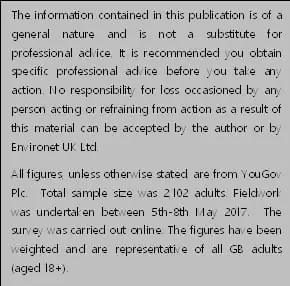A Survey on Japanese knotweed awareness amongst adults in Britain was carried out by YouGov plc on behalf of Environet UK Ltd in May 2017.

The survey, carried out by YouGov highlights a high awareness amongst adults in Britain of the problems associated with Japanese knotweed. In this summary we highlight and comment on some of the key findings. The data was collated on 5-8th May 2017.
75% of adults in Britain have heard of Japanese knotweed.
In Environet’s opinion this is an astonishingly high level of awareness, and probably attributed to significant media coverage over the last 5 years. The % increases with age, rising from 39% for the 18-24 year olds to
91% for those 55+. It seems we do indeed get wiser with age! Not surprisingly, the % also increases in badly affected areas, for example 95% of respondents in Wales had heard of Japanese knotweed.
78% of adults that had heard of Japanese knotweed would be put off buying a property affected by Japanese knotweed.
The gender split is 75% for men, 82% for women. The most common reason cited for being put off was concern that knotweed can’t always be eradicated or be removed at 65% for men and 73% for women. Are woman more risk averse? Other reasons cited were the difficulty (55%), time (57%) and expense (56%) of removing the plant.
Previous Environet estimates have indicated that up to 5% of UK properties might be affected by Japanese knotweed.
The Environet 5% figure interprets “properties affected” as being those where knotweed is present on the property or on an adjoining property. This figure is supported by the YouGov research with 1% of respondents, who were aware of Japanese Knotweed, claiming to have or have had it on their current property, 3% on their previous property, and 2% on their neighbour’s property. 3% of those respondents who would be put off buying a property if it had Japanese knotweed growing claim to have had a bad experience with Japanese knotweed in the past. It seems the problem is growing, literally.
67% of those aware of the knotweed thought that property value could be reduced by Japanese knotweed. Over 40% thought the value would be reduced by 10-20%. The value reduction will be dictated by many factors, such as extent, influence on adjoining properties, property type, value etc. and what can be agreed by a willing buyer and a willing seller. In our experience the reduction in value, once a treatment programme with an insurance backed guarantee is in place, is between 2 and 10%.
Only 23% of respondents aware of knotweed were also aware of dig-out methods for removing Japanese knotweed.
This figure was fairly consistent across gender, age and region. Physical removal of knotweed rhizome is considered more effective than herbicide treatment in the commercial sector. The low awareness amongst respondents is attributed to the vast number of knotweed companies offering low cost herbicide treatment only solutions. As the effectiveness of these treatments comes under further scrutiny we expect to see the number of dig-outs increase, following the trend in the commercial sector.
Sign up for more Japanese knotweed Beacon Articles.




